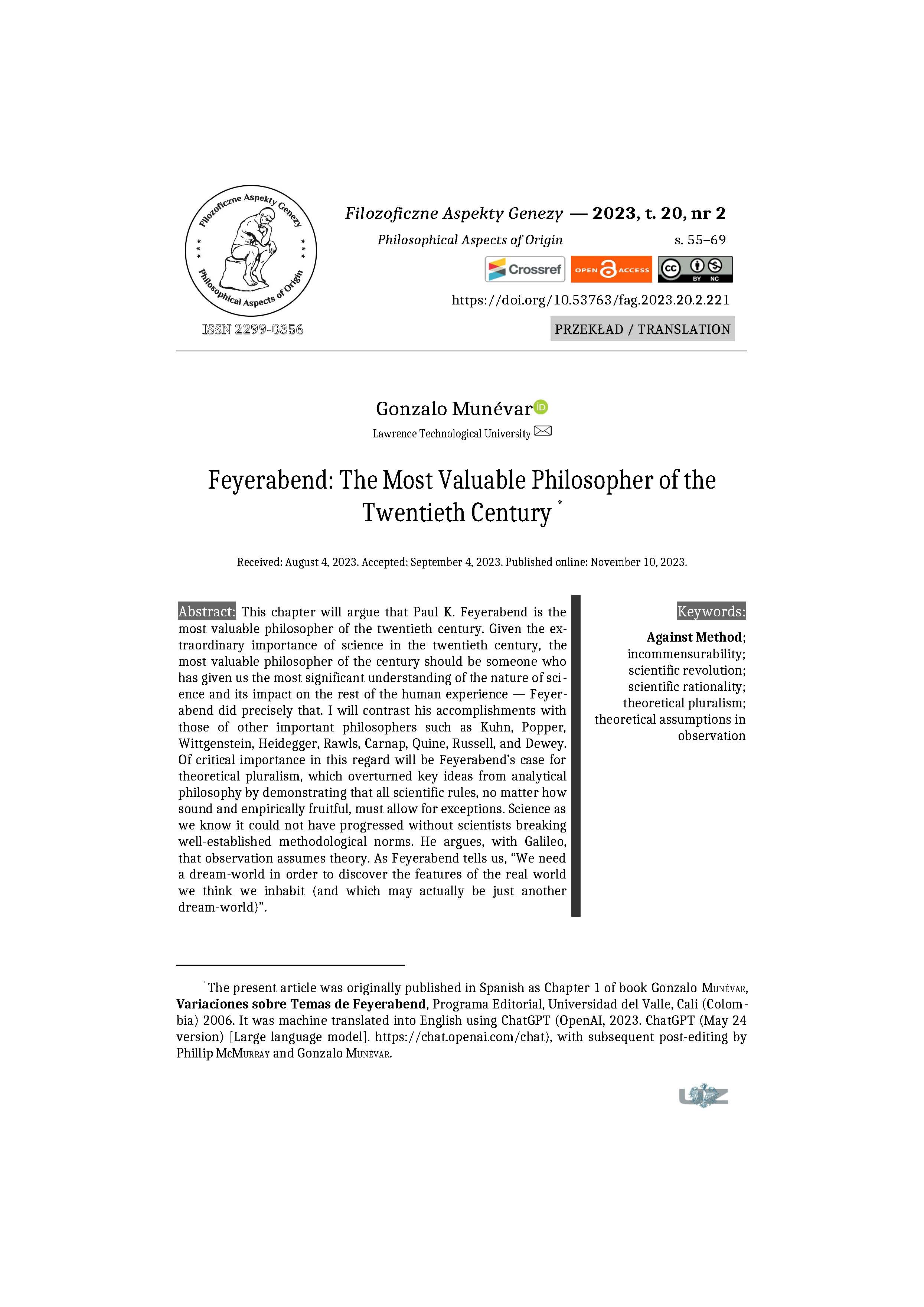
Opublikowane 10.11.2023 — zaktualizowane 28.05.2024
Wersje
- 28.05.2024 - (3)
- 08.12.2023 - (2)
- 10.11.2023 - (1)
Słowa kluczowe
- Against Method,
- incommensurability ,
- scientific revolution,
- scientific rationality,
- theoretical pluralism
- theoretical assumptions in observation ...More
Prawa autorskie (c) 2023 Filozoficzne Aspekty Genezy

Utwór dostępny jest na licencji Creative Commons Uznanie autorstwa – Użycie niekomercyjne 4.0 Międzynarodowe.
Jak cytować
Abstrakt
This chapter will argue that Paul K. Feyerabend is the most valuable philosopher of the twentieth century. Given the extraordinary importance of science in the twentieth century, the most valuable philosopher of the century should be someone who has given us the most significant understanding of the nature of science and its impact on the rest of the human experience — Feyerabend did precisely that. I will contrast his accomplishments with those of other important philosophers such as Kuhn, Popper, Wittgenstein, Heidegger, Rawls, Carnap, Quine, Russell, and Dewey. Of critical importance in this regard will be Feyerabend’s case for theoretical pluralism, which overturned key ideas from analytical philosophy by demonstrating that all scientific rules, no matter how sound and empirically fruitful, must allow for exceptions. Science as we know it could not have progressed without scientists breaking well-established methodological norms. He argues, with Galileo, that observation assumes theory. As Feyerabend tells us, “We need a dream-world in order to discover the features of the real world we think we inhabit (and which may actually be just another dream-world)”.
Downloads
Bibliografia
- Feyerabend Paul K., Against Method, Verso, London — New York 1975.
- Feyerabend Paul K., Explanation, Reduction and Empiricism, Minnesota Studies in the Philosophy of Science 1962, Vol. 3, H. Feigl and G. Maxwell, Minnesota 1962, https://tiny.pl/c5jlk [04.09.2023].
- Feyerabend Paul K., Killing Time: The Autobiography of Paul Feyerabend, Chicago University Press, Chicago 1995.
- Feyerabend Paul K., Science in a Free Society, NLB, London 1978.
- Feyerabend Paul K., The Conquest of Abundance, Chicago University Press, Chicago 2000.
- Galileo Galilei, Dialogue Concerning the Two Chief World Systems: Ptolemaic and Copernican, Modern Library of Science, New York 2001.
- Kuhn Thomas, The Structure of Scientific Revolutions, Chicago University Press, Chicago — London 1962.
- Lloyd Elizabeth A., Feyerabend, Mill, and Pluralism, in: John Preston, Gonzalo Munévar, and David Lamb (eds.), The Worst Enemy of Science?, Oxford University Press, New York — Oxford 2000, pp. 115–124.
- Margherita von Brentano, Letter to an Anti-Liberal Liberal, in: Gonzalo Munévar (ed), Beyond Reason: Essays on the Philosophy of Paul Feyerabend, Kluwer Academic Publishers, Dordrecht 1991, pp. 199–212.
- McKirahan Richard D., Xenophanes of Colophon, in: Richard D. McKirahan (ed.), Philosophy before Socrates: An Introduction with Texts and Commentary, Hackett Publishing Company, Indiana 1994, pp. 60–62.
- Munévar Gonzalo, A Rehabilitation of Paul Feyerabend, in: John Preston, Gonzalo Munévar and David Lamb (eds.), The Worst Enemy of Science? Essays in Memory of Paul Feyerabend, Oxford University Press, New York — Oxford 2000.
- Munévar Gonzalo, A Theory of Wonder: Evolution, Brain, and the Radical Nature of Science, Philosophy of Science, Vernon Press, Wilmington — Malaga 2021.
- Munévar Gonzalo, Conquering Feyerabend’s Conquest of Abundance, Philosophy of Science 2002, Vol. 69, No. 3, pp. 519–535, https://doi.org/10.1086/342457.
- Munévar Gonzalo, Evolution and the Naked Truth, Ashgate, Oxford — New York 1998, pp. 219–244.
- Munévar Gonzalo,Karl Popper's Evolutionary Epistemology, in: Andrés Rivadulla (ed.), Hypothesis and Truth in Science: Essays on the Philosophy of Karl R. Popper, Editorial Complutense, Madrid 2004, pp. 49–66.
- Munévar Gonzalo, Science in Feyerabend’s Free Society, in: Gonzalo Munévar (ed.), Beyond Reason: Essays on the Philosophy of Paul Feyerabend, Kluwer Academic Publishers, Dordrecht 1991, pp. 179–198.
- Munévar Gonzalo, Variaciones sobre Temas de Feyerabend, Programa Editorial, Universidad del Valle, Cali (Columbia) 2006.
- Popper Karl R., Objective Knowledge: An Evolutionary Approach, Oxford University Press, Oxford 1972.
- Theocharis Theo, Psimopoulos Mihalis, Where Science has Gone Wrong?, Nature 1987, Vol. 329, No. 6140, pp. 595–598, https://doi.org/10.1038/329595a0.


